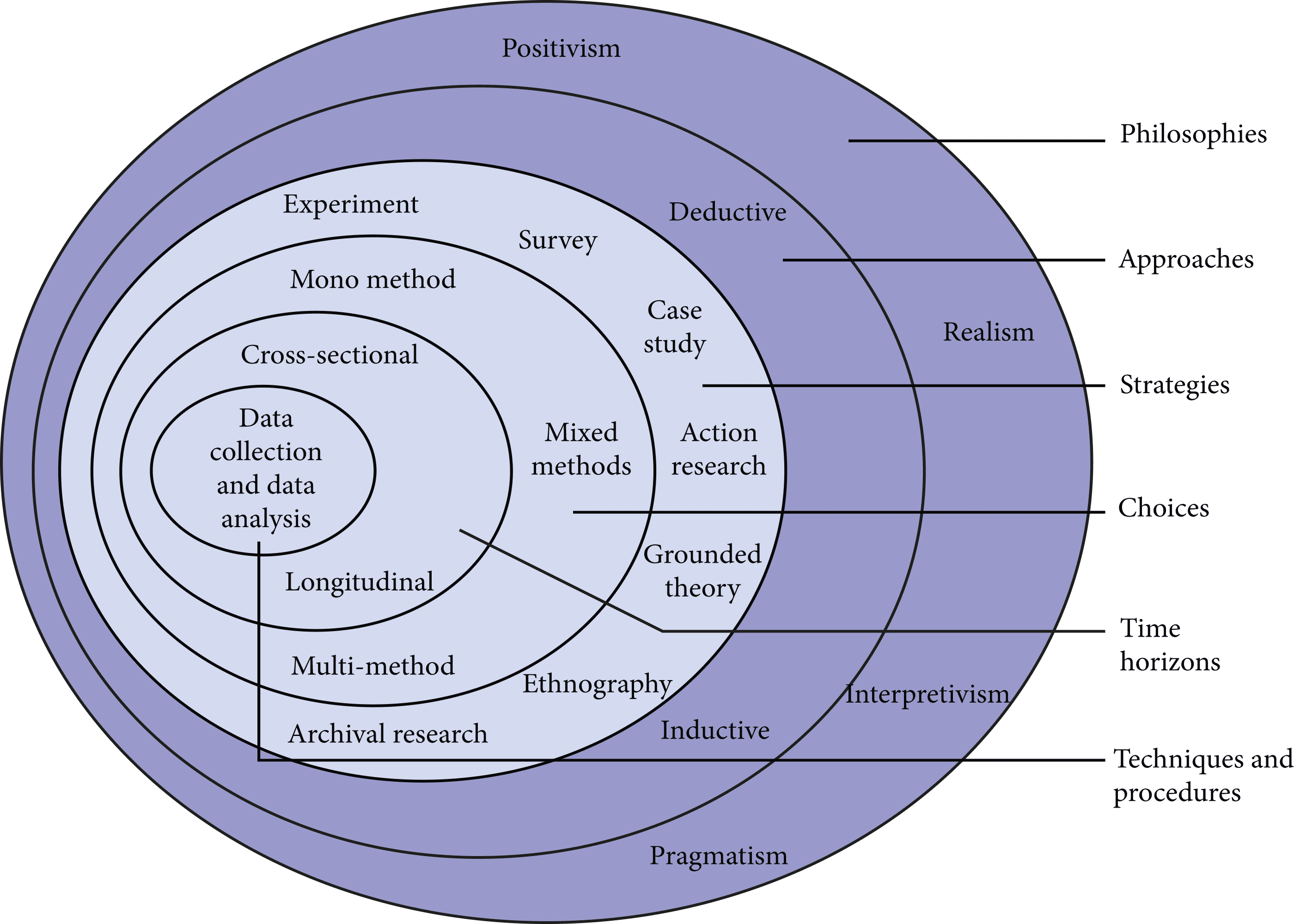Explore the World's Best Ideas
Join today and uncover 100+ curated journeys from 50+ topics. Unlock access to our mobile app with extensive features.
Research Methodology
Research Methodology is essentially the "how" of any specific piece of research.
It is primarily about how a researcher plans a study in a methodical manner to produce valid and reliable results that address the research aims and objectives.
54
705 reads
Research design is the framework of research methods and techniques
1. Step 1: Consider your aims and approach
2. Step 2: Choose a type of research design
3. Step 3: Identify your population and sampling method
4. Step 4: Choose your data collection methods
5. Step 5: Plan your data collection procedures
6. Step 6: Decide on your data analysis strategies
55
547 reads
Research Onion
At its most basic, Saunders' research onion illustrates the several considerations that must be made while designing a research approach. As you work your way inwards from the exterior of the onion, you'll encounter a variety of options that vary from high-level and philosophical to tactical and practical.
59
459 reads
What is Qualitative Research?
- Qualitative research is often defined as what it's not, it's not numbers. But more importantly, qualitative research differs from quantitative research in terms of the questions we ask.
- Instead of who, what, when, where, and how much, qualitative research is often about the how and why questions.
- For example, how do you eat persimmon? Why do some families love them so much?
51
363 reads
How is Qualitative different from Quantitative?
- There is no absolute truth. We assume that knowledge is conditional and subject to perception and interpretation.
- Importance of context. We recognize that the environments in which we and our participants live deeply influence our understandings.
- Importance of meaning. Understand how our participants themselves attribute meaning to events and experiences.
- Researchers are instruments of data collection. Our questioning strategy shapes the way we formulate additional questions.
- The researcher-participant relationship is key.
- Flexibility of research design.
- Inductive and messy analysis.
52
264 reads
5 Basic Approaches to Qualitative Research
John Creswell outlines five basic approaches in his book, Qualitative Inquiry and Research Design, choosing among five approaches.
1) Narrative qualitative approach
2) Phenomenology qualitative approach
3) Ethnography qualitative approach
4) Case Study qualitative approach
5) Grounded Theory qualitative approach
52
260 reads
Research Approach || Narrative
The narrative focuses on stories.
- We know that stories impact lessons, convey cultural norms, and develop a sense of community among listeners.
- Stories offer a chronologically ordered account of an event or series of events and the meaning attributed to them.
- In qualitative research, the analysis may focus on different types of stories. Their plot lines, the contexts underlying the story epiphanies, or core narratives or central lessons.
- For example, in one study of families' experiences of childhood cancer, researchers identified the core narrative, things will never be the same.
50
157 reads
Research Approach || Phenomenology
This focuses on lived experience and understanding the universal essence of a specific phenomenon.
- For example, a phenomenological study might focus on grief.
- How do individuals grieve a lost one?
- How do cultural practices affect the individual's grieving process?
- How is the loss of a child experienced as compared to the loss of an elder or a parent?
50
156 reads
Research Approach || Ethnography
Ethnography is a research method that helps us understand the culture of a group of people.
This includes learning about their shared beliefs, values, and behaviors.
An example of ethnography would be studying how a particular cultural group celebrates recovery from illness.
47
155 reads
Research Approach || Case Study
Case studies help researchers learn more about specific cases by looking at them from different angles. This way, they can better understand the key themes in that case.
Case studies can be about individuals, organizations, towns, cities, or any other bounded system. They often involve data collection from multiple sources, which is known as triangulation.
Researchers use case studies to answer specific questions about a case.
47
147 reads
Research Approach || Grounded Theory
Grounded theory is a research method where you let the data speak for itself. This means that you let the data inform the development of a new theory or model.
The theory you develop is based on the data, which makes it useful for researching new or under-researched issues.
Grounded theory research is a type of research that uses qualitative data.
This type of research involves identifying commonalities between sets of data, and the results are then drawn from the completed research.
There is no aim of fitting the findings in with a pre-existing theory or framework.
48
118 reads
Qualitative and Quantitative as complementary methods
Qualitative and quantitative methods can be complementary (also known as mixed-method). Sometimes we use them together, especially in public health.
We want to use tools that are well-suited to the research questions, and build on the strengths of each method.
When using a mixed method design, focus on three things:
1) whether it's an exploratory or explanatory study.
2) we need to think about whether the priority is the qualitative or quantitative portion.
3) keep in mind when to integrate the quantitative and qualitative components.
49
103 reads
Different Types of Qualitative Data
There are two types of data: naturally occurring data and researcher-generated data.
Naturally occurring data is stuff that exists without any help from researchers, like documents, archives, and transcripts of speeches.
Researcher-generated data is stuff that researchers create, like images, tweets, and Internet-based texts.
49
137 reads
Researcher-Generated Data
We'll primarily focus on what we call researcher-generated data. This is data generated through researcher interaction with the environment and/or participants. There are three types.
1) observation. Most qualitative research involves some observation. Data is generated by writing field notes.
2) interviews. One-on-one interviews are typically recorded and then transcribed verbatim.
3) focus group discussions. Small group discussions are facilitated by a moderator recorded and transcribed verbatim.
49
147 reads
IDEAS CURATED BY
CURATOR'S NOTE
Understand the basics of academic research
“
Weekly Concepts's ideas are part of this journey:
Learn more about business with this collection
How to create a diversified portfolio
How to analyze stocks and bonds
Understanding the basics of investing
Related collections
Discover Key Ideas from Books on Similar Topics
7 ideas
How to Read a Paper
Trisha Greenhalgh
7 ideas
Introduction to Statistics for Biomedical Engineers
Kristina M. Ropella
5 ideas
International Developments in Investigative Interviewing
Tom Williamson, Becky Milne, Stephen Savage
Read & Learn
20x Faster
without
deepstash
with
deepstash
with
deepstash
Personalized microlearning
—
100+ Learning Journeys
—
Access to 200,000+ ideas
—
Access to the mobile app
—
Unlimited idea saving
—
—
Unlimited history
—
—
Unlimited listening to ideas
—
—
Downloading & offline access
—
—
Supercharge your mind with one idea per day
Enter your email and spend 1 minute every day to learn something new.
I agree to receive email updates












